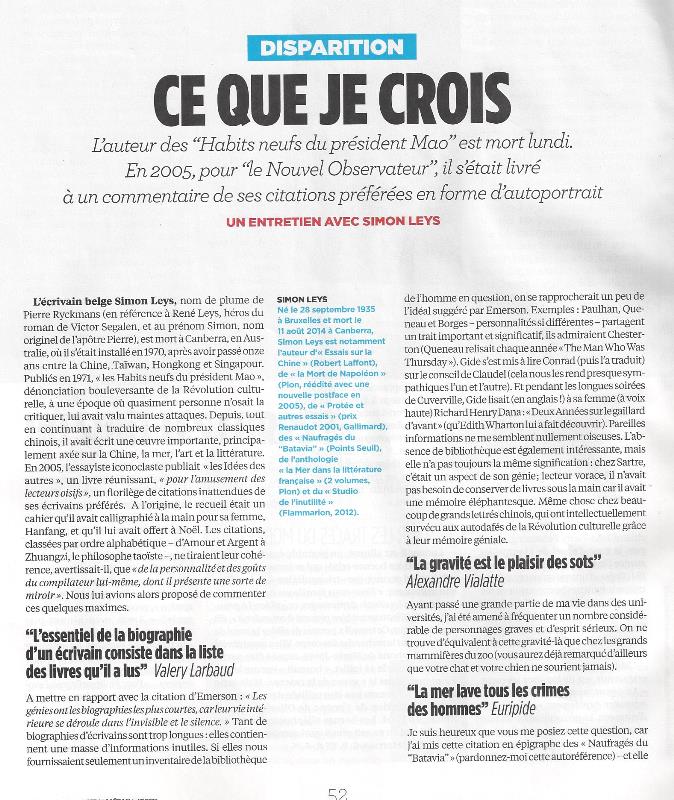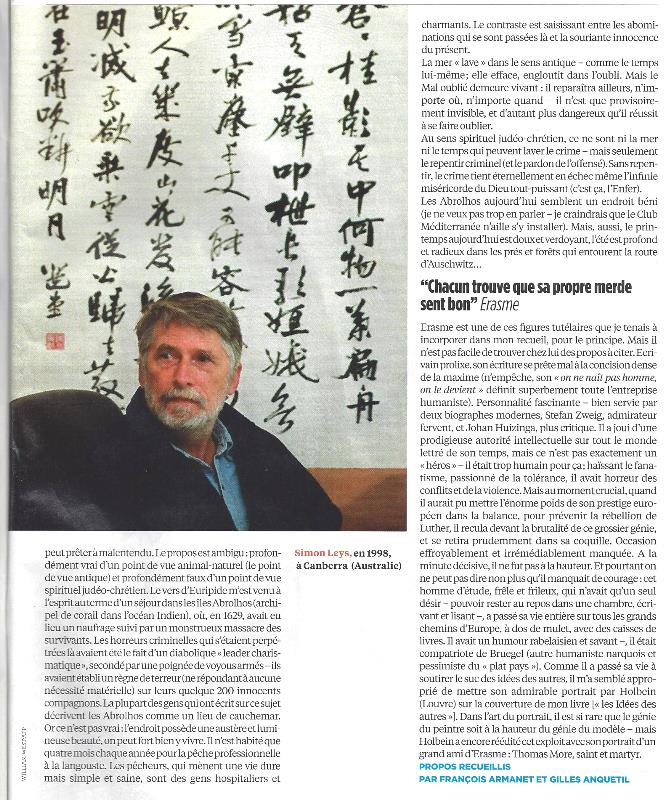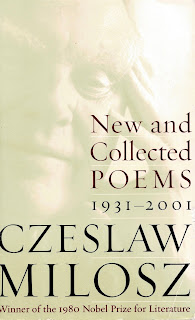Tribute to Simon Leys
Tribute Simon Leys
Obituary
Pierre
Ryckmans
WRITERS
choose pen names for many reasons. Pierre Ryckmans chose his—“Simon
Leys”—to
avoid being blacklisted by the Chinese authorities, who, he feared,
would not
appreciate his attempts to tell the world the truth about the horrors
of Maoism
and the Cultural Revolution. But his chosen surname contained a subtle
clue as to
who he really was. “Leys” was a homage to “René Leys”, a novel by the
French
author Victor Segalen, in which a Belgian teenager in old Peking
regales his
employer with tales of the hidden intrigues and conspiracies taking
place
within the imperial palace.
Like René,
Mr Ryckmans was Belgian. He too had visited China when he was a
teenager—in
1955, to be precise, on a trip with a group of fellow students that had
culminated in an audience with Zhou Enlai, second in command, after Mao
Zedong,
of the newly minted People’s Republic. He had fallen in love with the
place on
that trip, he later wrote, and devoted his career to studying China.
And like
René, he became famous for trying to tell his readers what was really
going on,
both within the palace walls and without. Swimming against the tide of
intellectual opinion in the West, which tended to see Mao as an
admirable
champion of the ordinary Chinese worker, Mr Ryckmans described, with
wit and
anger and mordant humour, the skilfully choreographed shadow play that
the
regime presented to the world. Behind the talk of the victory of the
proletariat and great leaps forward lay repression, famines and the
terrorising
of a nation.
He had not
set out to write about politics, although he was himself a socialist,
of the
democratic, anti-totalitarian sort (George Orwell was a guiding light).
His
interests were painting, history and poetry: his writing was peppered
with fond
references to old Chinese proverbs and stories. Nor was he a China
bore: he was
as happy discussing Cervantes, sailing or the life of Napoleon as he
was
pondering the epigrams of Confucius (whose “Analects” he translated in
1997). But
China remained his great love, and at first he “confidently extended to
the
Maoist regime the same sympathy that I felt for all things Chinese”.
It was while
living in Hong Kong in the 1960s, when it was still a British colony,
that the
true nature of the regime became apparent to him. Pamphlets circulated
describing the forced displacement of millions of people into the
countryside
in the Cultural Revolution. Rumours spread about denouncements of the
ideologically unsound by friends or even family members. Thousands of
desperate
Chinese risked their lives to swim by night across the waters to Hong
Kong,
seeking sanctuary from the brutality.
Goaded from
his comfortable ignorance, he wrote a book called “The Chairman’s New
Clothes”,
which described the Great Helmsman as an autocratic emperor in the old
tradition, complete with jostling, scheming subordinates. It chronicled
the
murders and terror of the Cultural Revolution, and the destruction of
books,
temples and anything else that, to the fanatical Red Guards, was a
reminder of
China’s feudal past. In another book, “Chinese Shadows”, based on a
six-month
stint at the Belgian embassy in Beijing in 1972, he described the
Cultural
Revolution as “five years of upheaval, of blood and madness”, “the most
gigantic
frenzy…since the Taiping Rebellion” (in which, between 1850 and 1864,
20m
people died) and a “deliberate destruction of intelligence and culture.”
Seeking
truth from facts
His fellow
Sinologists—who ran the gamut from ignorance of reality to sympathy for
Mao to
a craven desire to avoid rocking the boat—were aghast. Leave the
politics to
the journalists, advised one well-meaning mentor, and focus on studying
the
classics. But he couldn’t. To talk about China, he said, meant talking
about
the everyday reality experienced by its people. He wrote with contempt
of
“China experts” who would be horrified at the thought of travelling by
bus
rather than officially organised car, or of eating with the common folk
at a
noodle stall.
Eventually,
of course, his real identity was exposed. That did not stop him; he was
stubborn and principled, and besides, he was right. Being right had not
even
required any particularly special effort: before his stint at the
embassy he
had not set foot in China in years. All it took, he said, was listening
to
Chinese friends, keeping up with dispatches from trusted sources and
reading
the official press with a sceptical eye—and the courage to recognise
the
uncomfortable truth that, whatever romance it may have once possessed,
Mao’s revolution
had become a nightmare.
Mr Ryckmans
predicted that, one day, the chaos of the Mao years would fade and that
the
Communist Party’s totalitarian grip would ease. Sure enough, these days
even
the party admits that the Cultural Revolution was a “disaster”, and
that
millions died in the famine that followed the Great Leap Forward, an
earlier
attempt at collectivisation. But the fundamental nature of the regime,
he said,
would not change. He was right about that, too. Deng Xiaoping, Mao’s
eventual successor,
brought prosperity by liberalising the economy. In today’s China a
little
criticism is even tolerated—but only if it does not seriously threaten
the
party’s rule.
The Ecocomist


By MICHAEL
FORSYTHEAUG. 14, 2014

NYRB đọc
The Hall of Uselessness: Collected Essays
by Simon Leys
The Hall of Uselessness: Collected Essays
by Simon Leys
Note: Leys là 1 chuyên gia
về văn học TQ. Độc giả TV biết tới ông, lần đầu tiên, khi Leys phạng
Malraux thật ra trò, và Vargas Llosa phải lên tiếng, chửi nặng quá, và
không đúng!
Đọc thấy câu này trong bài điểm sau đây, thú quá, đúng quá.
Đọc thấy câu này trong bài điểm sau đây, thú quá, đúng quá.
Iconoclasts,
not only in China, are as enthralled by the sacred properties of the
objects they destroy as those who venerate them. This much we know. But
Leys goes further. In his view, Maoists didn’t just reduce the walls of
Beijing, and much else besides, to rubble because they believed such
acts would liberate the Chinese people; they smashed Yuan and Ming and Qing
Dynasty treasures because
they were beautiful.
Những đệ tử của Mao không
chỉ biến những bức tuờng thành của Bắc Kinh thành tro bụi, do họ tin là
làm như thế, là để giải phóng dân Tẫu: Họ tàn phá những kho tàng từ
những thời Hán, Minh… bởi là
vì chúng đẹp quá.
Cái thảm họa sau 30 Tháng
Tư 1975, và những tội ác của VC Bắc Kít, sở dĩ xẩy ra, chính là vì Miền
Nam hạnh phúc quá, đẹp quá so với xứ Bắc Kít!
Đám VC Bắc Kít phát điên lên được!
Chứng minh đơn giản nhất: Liệu có, chỉ một, bà vợ sĩ quan VC nào, lặn lội đi thăm chồng, bị cải tạo, ròng rã bao nhiêu năm trời?
Đám VC Bắc Kít phát điên lên được!
Chứng minh đơn giản nhất: Liệu có, chỉ một, bà vợ sĩ quan VC nào, lặn lội đi thăm chồng, bị cải tạo, ròng rã bao nhiêu năm trời?
Gấu đọc Leys lần đầu, trên
tờ NYRB, bài về Don Quixote,
và chôm liền, đi 1 đường Tạp Ghi cho tờ Văn Học của NMG. Rồi sau đọc
thêm bài về Malraux, cũng chôm liền, và khi bèn thừa thế xông lên, bệ
cuốn cuốn essay của ông, và chôm luôn, bài viết về Greene!
Hà, hà!

Comments
Post a Comment